Democratic Republic of Congo: M23 rebel forces 'withdraw'
The M23 rebel group in eastern Democratic Republic of Congo has said it will stop fighting, following days of clashes with UN-backed forces.
M23 official Museveni Sendugo told the BBC its forces had already pulled back 5km (three miles) from the frontline.
Rebel leader Bertrand Bisimwa said the pull-back would allow an independent investigation into how shells fell over the border in Rwanda on Thursday.
The Congolese army denies Rwandan accusations it fired the shells.
DR Congo and the UN accuse Rwanda of backing the M23, a charge it denies.
Their troops have been pounding rebel positions on the Congolese side of the border with Rwanda near the city of Goma since last week.
As tension escalated on Thursday, UN Secretary General Ban Ki-moon appealed to Rwanda's president for restraint.
Rwanda twice invaded its much larger neighbour during the 1990s, and the border area has been unstable for two decades.
Rwanda's Deputy Permanent Representative to the UN in New York, Olivier Nduhungirehe, told the BBC's Focus on Africa that "a red line was crossed" by DR Congo on Thursday when he said a Rwandan woman was killed in cross-border shelling.
The M23 rebels, he said, were an "internal problem" within DR Congo, and the Congolese government "should not drag Rwanda" into the dispute.
He denied allegations by the Congolese information minister that 300 Rwandan troops had been fighting alongside the M23 rebels.
Rwandan Foreign Minister Louise Mushikiwabo on Friday tweeted: "Rwandan troops are not in DRC (yet), when they are, you will know."
A newspaper close to Rwanda's government has published photographs showing a military build-up near the border with DR Congo.
Congolese government spokesman Lambert Mende told the BBC's Newsday programme that M23 rebels were firing onto Rwandan territory "to give Rwanda a pretext for coming in openly in this war".
The UN peacekeeping mission in DR Congo, Monusco, recently deployed a new 3,000-strong intervention brigade to tackle the rebels.
'Cannot be tolerated'
Ms Mushikiwabo on Thursday said that 23 "bombs and rockets" had been fired into Rwanda this week.
She accused DR Congo forces of targeting Rwandan civilians, and said: "We have remained restrained for as long as we can but this provocation can no longer be tolerated."
BBC Great Lakes service editor Ally Yusuf Mugenzi says that even when Rwanda invaded Congolese territory, it never made such strong accusations against the Congolese army.
Congolese army spokesman Col Olivier Hamuli told the BBC that his forces would never fire at civilian populations.
"That could only be rebels," he said, adding that M23 fighters, and not soldiers, were in the area from which the shells were fired.
This was backed up by Mr Ban's assistant, Edmond Mulet, who told the UN Security Council on Thursday that UN forces in the DR Congo had witnessed M23 rebels firing artillery into Rwanda but not the Congolese army, diplomats said.
Mr Mulet ended the session by informing members that Mr Ban had telephoned Rwandan President Paul Kagame to urge restraint.
South Africa warning
Meanwhile South Africa, which has troops in the UN force, has warned the rebels not to try to occupy Goma.
"We're trying to send a message to the M23: This time around you're not going to see Goma," Lieutenant General Derrick Mgwebi of South Africa's defence force said, according to the AFP news agency.
At least 800,000 people have fled their homes in DR Congo since the M23 launched its rebellion in April 2012.
They briefly occupied Goma in November 2012 before pulling out under international pressure.
The M23 rebel movement is named after a 23 March 2009 peace deal that ended four years of rebellion in eastern DR Congo.
The rebels complained the Congolese government had failed to honour the agreement, which included integrating them into the army.
The M23 are mainly ethnic Tutsis, like most of Rwanda's leaders.
Eastern DR Congo has been wracked by conflict since 1994, when Hutu militias fled across the border from Rwanda after carrying out a genocide against Tutsis and moderate Hutus.
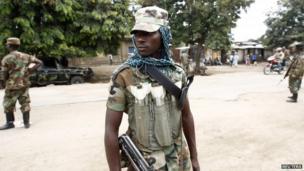
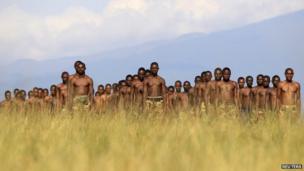
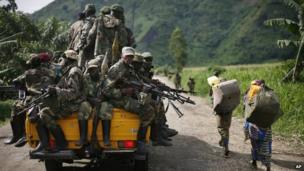
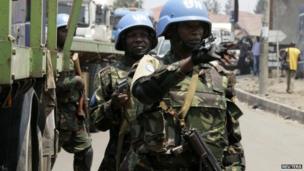
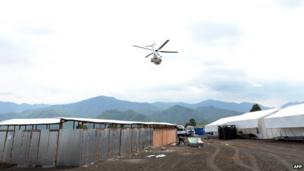
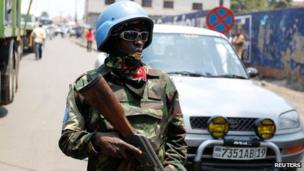
No comments:
Post a Comment